Category : Air Pollution | Location : International | Posted on 2021-08-10 00:26:19

The world’s biggest emitters of greenhouse gases must produce clear plans to cut their carbon output drastically, the president of vital UN climate talks has urged, after scientists warned there was only a small chance of escaping the worst ravages of climate breakdown.
The Intergovernmental Panel on Climate Change set out the starkest warning yet on the widespread and “unprecedented” changes to the climate that are “unequivocally” the result of human actions. Extreme weather resulting from these changes was already seen around the world and growing worse, in the form of rising temperatures, more frequent and fiercer storms, heatwaves, droughts, floods and sea level rises, according to the biggest assessment of climate science in eight years.
Global temperatures were likely to top 1.5C above pre-industrial levels in the next two decades, the threshold set as the ambition of the 2015 Paris climate agreement, the world’s climate science authority said. Only sharp and immediate cuts in greenhouse gases this decade could stabilise the climate system.
Alok Sharma, the UK minister who will preside over the Cop26 UN climate summit in Glasgow this November, said countries must act. “If ever there was going to be a wake-up call to the world when it comes to climate change, this report is it. But the future is not yet written. The very worst of climate change is still avoidable.”
The Paris climate agreement ambition of limiting warming to 1.5C, and staving off the worst impacts of climate breakdown, was “still achievable, but retreating and retreating fast”, he said.
“What we really need now is for all major emitters to play their part, and the G20 are going to be absolutely key to our 1.5C future,” he added. G20 governments, comprising the world’s biggest economies and including developed and developing countries, are responsible for about 80% of global greenhouse gas emissions, and about 85% of GDP.
Sharma did not single out particular governments, but those yet to put forward plans for emissions cuts before Cop26 include China, India and Brazil.
The spotlight now falls firmly on China, the world’s biggest emitter and second largest economy, and the biggest producer and consumer of coal, the dirtiest fossil fuel.
“This must be the Cop that consigns coal to history,” said Sharma.
Helen Mountford, the vice-president of climate and economics at the World Resources Institute, said this decade was “truly our last chance” of keeping to a relatively safe climate, and the actions of leading emitters would be crucial. “It’s imperative for China to announce more stringent emission reductions than it has hinted at thus far,” she said.
China has set out a target of reaching net zero emissions by 2060, and has said its emissions will peak by 2030. But the government still plans new coal-fired power plants, and its reliance on coal returned after a slowdown caused by the Covid-19 pandemic, despite the falling price of wind and solar power making them cheaper than coal. The International Energy Agency has warned that global emissions will rise next year by a record amount, largely driven by a resurgence in coal in China.
Bernice Lee, the research director for futures at the Chatham House thinktank, said: “Coal in China is indeed a deal-breaker when it comes to 1.5C, as John Kerry said a couple of weeks ago. Luckily, the economics of coal versus renewables should make this an easier lift for China.”
For China to come forward with new commitments on emissions, the actions of the US would be key, argued Paul Bledsoe, a former Clinton White House climate adviser, now with the Progressive Policy Institute in Washington DC. The US president, Joe Biden, has vowed to halve US emissions by 2030, provide billions in climate finance to poor countries and initiate a sweeping programme of incentives and regulations to stimulate a low-carbon economy.
“The US Congress must pass President Biden’s ambitious climate plan ahead of Cop26, to both lock in strong American action and put added pressure on China and other major emitters to finally cut their emissions,” he said. “Without both the US and China making deep emissions cuts, the Paris targets cannot be achieved.”
While China will now be a clear focus, other big emitters in the G20 such as India, Indonesia, Mexico and South Africa will also be key targets of the UK’s climate diplomacy in the two and a half months remaining before Cop26.
The voices of poor countries must also be heard, insisted Ellen Johnson Sirleaf, a former president of Liberia and member of the Elders group of senior former leaders. “We see the climate crisis already unfolding before our eyes and for people in the global south this is an emergency we are already living through. As the scientific evidence mounts, so too does the need to address the concerns vulnerable countries are raising,” she said. “The science is robust; the response to this environmental and human rights emergency needs to be just as solid.”
Diann Black-Layne, Antigua and Barbuda’s ambassador for climate change and the lead climate negotiator for the Alliance of Small Island States, said it was “essential that global powers and major emitters heed the scientific evidence and take action” on greenhouse gases, as well as providing financial help to poor countries.
She said: “The IPCC confirms the experience of small island states: that cyclones are getting more intense, and that sea levels are rising, but it also confirms that we can still curb the worst of it. The stark fact is that if we keep warming to 1.5C we are still facing half a metre of sea level rise. But if we stop warming from reaching 2C, we can avoid a long-term three metres of sea level rise. That is our very future, right there.”
Source: https://www.theguardian.com/environment/2021/aug/09/worst-polluting-countries-must-make-drastic-carbon-cuts-says-cop26-chief